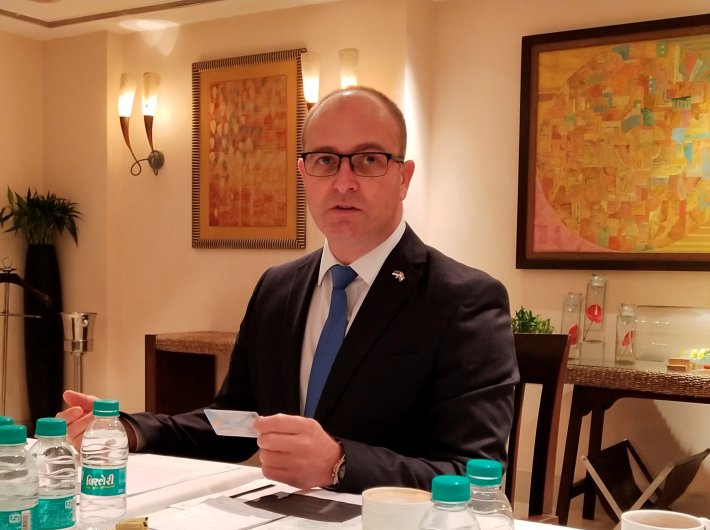Riho Kruuv, Ambassador of the Republic of Estonia talks on key issues like the importance of e-Residency programme of the Government of Estonia
Riho Kruuv, Ambassador of the Republic of Estonia talks to Vishwas Dass on key issues like the importance of e-Residency programme of the Government of Estonia and why Estonia is becoming a preferred investment destination for Indian startups and budding entrepreneurs. The Ambassador says Estonia offers a Euro 500 million European Union (EU) market to Indian entrepreneurs.
Kindly explain how the e-Residency programme came into being? What was the need to introduce this programme?
Estonia is a small country with just 1.3 million population and is a Euro 500 million market in the European Union. We started our journey in the early 90s when the country got independence after the Soviet Union collapsed and then we needed to build up our country. It was a challenge to get the government system in place. That was the time when personal computers and internet boom had started coming in. Our government has taken two key decisions such as the need for having a digital identity and the idea was aimed to serve the purpose of giving digital ID cards to citizens. It gave an opportunity to authenticate residents through digital means. Initially, when it was first introduced in early 2000 it was just like a piece of plastic but then the government decided that all government agencies should initiate programmes to offer online services to people. And then the chip-based digital ID cards were introduced by the government. The card was made obligatory for Estonians. A few years later we came up with mobile-ID which was a state-issued digital identity to authenticate people without physical contact. It serves the purpose of producing digital documents. People can avail over 3,000 services through this.
When nearly all of the government services were made online then the government rolled out e-Residency programme in 2014 which is a chip-based card having a personal identification code. It does not give you citizenship rather it gives digital identity with Estonian government and one can get access to digital services and sign documents digitally. The e-Residency programme gives an opportunity to open a company in Estonia in the European Union through the internet. Estonia has a world record in ease of starting a company through the internet which can be done within 18 minutes which opens a Euro 500 million market to the budding entrepreneurs. With this card, one can start using government services. The card enables entrepreneurs to sign contracts in digital format. One can also avoid engaging with middlemen and bureaucrats which is an important factor in many of the countries. India is the largest workforce in the world and this platform gives an opportunity for Indians to run business in Estonia. Indians are very entrepreneurial and a large number of companies are run by Indians. People sometimes face difficulties in moving foreign currency from one country to another or doing transactions and there comes the role of e-Residency. If you deal with companies in the US or the EU, bringing money into India is very easy but taking it out of India is a daunting task. While having a company in Estonia one can easily use Estonian company for doing transactions in the US or the EU.
What is the process of getting an e-Residency card? Kindly name a few noted Indians who are e-Residents of Estonia?
The process of getting e-Residency card is easy and one needs to pay a fee of Euro 100 after logging into a website of the said programme and within two to three weeks one can get his/her card through Estonian Embassy. Earlier, one needed to go to Estonia to get your company running.
Some of the prominent Indians who are Estonian e-Residents are the minister of law and justice and information technology Ravishankar Prasad and business tycoon Mukesh Ambani. The minister does not have any projects in Estonia but he visited the country in 2016 to learn the digital initiatives of Estonia and the Estonian government had gifted him the e-Residency card. We feel proud to have such a prominent e-Resident.
Ambani has set up a research center for Jio in Estonia which is aimed at understanding the digital society of Estonia and offering benefits to Indians. The center is headed by Taavi Kotka, former chief information officer of Estonia and one of the founders of e-Residency programme.
How many Indians have got e-Residency cards and how many companies have been set up by Indians in Estonia?
Estonia has over 80,000 e-Residents from 167 countries which includes India’s 2,300. India stands ninth position in terms of having e-Residents in Estonia. There are 307 companies established by Indian entrepreneurs in Estonia which is more than China. Finland has set up the maximum number of companies in Estonia followed by Russia, Ukraine, Germany, the US, and the UK. Estonia and Finland share the same culture and heritage. Even, Estonia has come to a point where it shares its digital data with Finland. The reason why Estonia has the largest number of e-Residents from Finland is Estonia has a favorable tax regime. Estonia has zero corporate income tax system which means that as long as someone keeps money in the company and uses the money to buy services from other companies one need not pay the taxes.
In a small country like Estonia, we have around 700 technology startups in sectors like ICT, smart city, IoT, artificial intelligence, cybersecurity, and robotics.
What measures does the Estonian government has taken to prevent people from parking illegitimate money through e-Residency programme?
Estonia is the part of the European Union and the country strictly apply all regulations what concern money laundering and banking regulations. That is why most of the banks require a person to go to Estonia to identify his/her identity just to prevent frauds. When you apply for e-Residency, there is some security background check and weed out unscrupulous people who may have found involved in money laundering or some other areas. You can’t really define at the outset that who is a good person and who is not.

